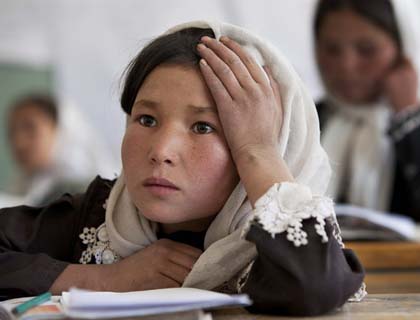There are almost half of school age Afghan children who are deprived of education and will die illiterate. Since ouster of Taliban regime in 2001 and establishment of the transitional government in 2002, millions of dollars have been spent and invested for the reconstruction of the country's infrastructures. But still, attending college and university for almost half of Afghan young generation is like day-dreaming.
There are many reasons like, security threats, poverty, sexual harassment, low ethical standards and lack of schools and quality materials that have influenced to this matter. "Almost half of school-age children in Afghanistan do not have access to education," President Hamid Karzai said on inauguration day of a school in 2010 that was published on http://www.rawa.org/temp/runews/2010/03/06/no-school-for-almost-half-of-afghan-children.html. This quote indicates that half of the Afghan school age children die uneducated. Education forms the fundamental infrastructure of a country. The nation that lacks this fundamental feature is considered the most vulnerable nation in today's leading world of technology.
When it comes to talk about peace and security issues in Afghanistan, Taliban are one of the main topics of the talks. "Since the Taliban regime was overthrown in 2001, we can see a considerable augment in the number of children attending school; but still, there are five million school age children who do not go to school in country." President Hamid Karzai said on inauguration day of school in 2010, mentioned above.
There are mainly two most vulnerable regions that are being affected directly. The central regions, they are being disadvantaged of education due to lack of facilities and government's discriminations. The southern regions, they are being deprived of education due to lack of security.
"There were 651 schools closed in southern provinces, 141 teachers and students were killed since beginning of the year, and 173000 students dropped off schools in 2009." Spokesman for Ministry of Education said. Moreover, the provincial council said. "There has been a major decline recently in the number of pupils, especially girls, attending school in central province of Ghanzi." (Source: http://www.rawa.org/temp/runews/2009/01/05/651-schools-close-in-southern-afghanistan.html.) Security threats have been negatively affecting the moral of the students. Security issues are one of the most problematic factors in term of enhancing the world class educational standards in the country. The government and its alliances have been seriously fighting against this dilemma to overcome the issue. But still they have not been able to cope up the fragile security problems in the country.
There are dozens of Afghan families who have lost their family man during the civil war and do not have any one to financially support their families. In order to overcome this matter, these families prefer their school age children to work rather than attending school. Orphan children and unsheltered ladies cleaning the cars on crossroads in Kabul city is one of the most visible and clear example of the poverty rate in the country.
There are number of children around seven year old cleaning and washing cars while tolerating the virus polluted air, till late evening across the roads in the cities. There are families whose children are sleeping hungry during the night. Poverty is another factor that has made the nation to forget about quality education; instead, everyone tries to survive of not dying of hunger.
The lack of school and quality materials has extensively affected the standard and quality of education in the country. Since the transitional government was established in 2002, many international and national organizations have rushed in Afghanistan. They have been working to reconstruct the war-torn infrastructures of the country. But unfortunately; there are still schools that are housed in tents instead of building.
Schools that are housed in tents can be easily targeted by the extremist militants than the ones housed in buildings. Schools without building are more vulnerable and the parents do not dare to allow their children attend the schools housed in tents. The offensive conditions of schools and the low quality study materials are demoralizing the children to attend schools.
In addition, the curriculum being applied in schools and universities of Afghanistan are out of date and none-standard. This is the age of technology and civilization, but poor Afghan children do not have access to a world class educational curriculum yet. Low quality study materials and limited number of schools with very limited facilities are the other factors that have contributed to the declining graph of educational standards.
In contrast to other countries, the dullest students are being filtered and placed in education and training faculties of the government universities in Afghanistan. This policy of the government itself is a huge risk for the quality of education and degrades the educational standard.
In addition, in comparison to other societies; the teachers are not being considered as the vital human resources of the government civil service structure. This is the basic issue that neither the government nor the nation is concentrating on.
The wage for a primary grade teacher is not more than 8500 AFN in a month which is even less than a simple clerk's salary working in a ministry. This situation and injustice with the teachers have caused the intelligent students to ignore this field and the government has got no option other than placing students with the lowest score in these faculties.
We initially need to have and train qualified teachers in order to have qualified ruling leaders. The primary solutions to the current issues are educating the new generations of the country and critically thinking of developing useful peace strategies.
Considering all the issues and resistances that we are facing, we will not be able to handle the situation unless we have figured out our responsibilities as the citizens of this country. It is not only government's responsibilities to fight against the insurgencies. It is every individual's responsibility to work for the enhancement and cooperate with the government to pave the way for the better development of the country.

